Make-or-break situations are bound to crop up in the course of a couple’s lifetime. After all, two people can’t possibly agree on everything. But when deal-breakers become the norm of the day, partners begin delivering ultimatums in relationships. They usually appear at the peak of a conflict when the individual puts their foot down once and for all. Or so we usually think.
We need a nuanced understanding of this situation; one cannot categorize ultimatums in a marriage or a partnership as good or bad. So, we will discuss the intricacies of the subject with Utkarsh Khurana (MA Clinical Psychology, Ph.D. scholar) who is a visiting faculty at Amity University and specializes in anxiety issues, negative beliefs, and individualism in a relationship, to name a few.
Our focus lies on the reasons behind the ultimatum and the frequency of such final warnings. These two factors will help us ascertain whether ultimatums are healthy or not. In addition to this, we talk about how to respond to an ultimatum with composure. Let’s answer all your questions step by step. Here’s all you need to know about ultimatums in relationships.
What Are Ultimatums In Relationships?
Table of Contents
Before delving into the analysis of relationship ultimatums, it’s crucial to define them. According to Utkarsh, ultimatums occur when one partner takes a firm stance, outlining undesirable consequences if the other persists. In some cases, giving an ultimatum can be a last resort after repeatedly bringing up issues related to a partner’s behavior. This varies in intensity, from minor disputes to situations that end up negatively affecting the entire relationship.
Let’s simplify with an example: Steve and Claire, dating seriously for two years, faced problems due to Steve’s workaholism. Claire decided to give an ultimatum, sparking debates on its nature — Was it caring advice or emotional manipulation? To understand, we’ll explore the healthiness of ultimatums in relationships. Is it a red flag for Steve, or is Claire genuinely prioritizing his (and her) well-being? Here are some key factors that define ultimatums:
- Firm stance: Ultimatums involve one person taking a strong and non-negotiable position during a disagreement
- Consequence declaration: It includes outlining undesirable consequences that will follow if the other persists in a certain behavior or it can result in a reverse ultimatum by the other
- Spectrum of intensity: Ultimatums can range from minor issues triggering arguments to major ones leading to reevaluation of the entire relationship
- Subjective nature: Definitions of ultimatums vary between couples, shaped by individual dynamics and preferences
- Communication tool: Often used as a communication strategy to address persistent issues and seek resolution
- Relationship impact: Depending on how boundaries and ultimatums are respected, they can either contribute to a healthier dynamic or raise concerns about manipulation
Are Ultimatums Healthy In Relationships?
The lines between boundaries and ultimatums often get blurry. A Reddit user writes, “Surely ultimatums are good because you are making clear your boundaries and informing your partner the consequences of their decisions?” while another user says, “Ultimatums are when you’re trying to manipulate behavior with threats. You’re forcing someone to listen to you out of fear, not love or respect.”
Relationship expert Utkarsh offers an incisive insight, “While things are highly subjective, we can make a reasonable deduction about the nature of an ultimatum through two factors. The first is a person’s intention: With which intent was the warning delivered? Did it come from a place of concern and care? Or was the aim to control you? Needless to say, only the individual on the receiving end can decipher this.
“The second factor is how often ultimatums are given. Does every difference of opinion escalate into a do-or-die fight? Ideally, ultimatums in relationships should be sparse. If they are very common, it suggests that the couple is having trouble with healthy conflict resolution. On the other hand, if the ultimatum checks out on both parameters, i.e., it is spoken out of concern and given rarely, it can be classified as healthy. Because warnings can act as an anchor too. If Partner B is falling into unhealthy patterns, Partner A can get them back on track with a reasonable ultimatum.”
Related Reading: 10 Things That Make A Good Relationship – As Per An Expert
‘We’ vs. ‘I’ — What lies behind making demands in a relationship
Here’s a life hack that’ll go a long way in helping you build a healthy relationship: Listen to the phrasing when someone gives you an ultimatum in a relationship. Utkarsh says, “If the warning begins with an ‘I’ – ‘I will leave you’ or ‘I am going to move out of the house’ – it generally means that the ego has entered the picture. Your partner’s focus lies on themselves. A much more constructive way of stating things would be through ‘we’ – ‘We need to do something about this right now’ or ‘We will have to part ways if this problem isn’t resolved.’”
Of course, this is only a guiding tip to help you identify your partner’s intentions and how to respond to an ultimatum. Not every ‘I’ sentence will be problematic as well. The unfortunate reality is that a lot of people use ultimatums to win the power struggle in relationships. It makes the person on the receiving end feel powerless, insecure, and unloved.
Nobody likes feeling that their partner is ready to walk away with a mere warning. When ultimatums are used to induce compliance repeatedly, they start affecting the couple’s dynamic adversely.
Related Reading: 11 Things Toxic Partners Often Say – And Why
As America’s beloved family therapist, Dr. Phil, once said, “Relationships are negotiated and if you deal with ultimatums and authority all the time, then you’re not going to get anywhere.” It’s time to understand how ultimatums ruin relationships and can negatively affect your emotional connection. There are many reasons to stop making demands in a relationship, so let’s take a look at the impact of not prioritizing communication.

What Makes Ultimatums Dangerous for Your Relationship?
Some of the drawbacks of ultimatums are undeniable. Envision a charged atmosphere where emotions surge, and one partner decides to wield the ultimatum card. It’s not merely a heated moment; it’s a strategic choice laden with consequences that reverberate long after the initial disagreement subsides. It leaves many couples confused; most of them can’t be on the same page after that. Do you feel like that too?
A Reddit user writes, “Ultimatums can also be bad in that they will sour a relationship. Even if the other party picks you, it often leaves a bad taste so to speak and worsens their opinion of you.” Ultimately, the question becomes not just about the resolution of the immediate issue. It’s now about finding the best way to move forward in the face of such a risky gamble. The next time you’re about to issue an ultimatum to your partner, make it a point to recall the following negative aspects. Chances are, you’ll take a pause and rethink your words or risk losing a perfectly normal relationship.
Related Reading: 7 Zodiac Signs That Are Known To Be Master Manipulators
1. Ultimatums undermine trust
Trust, the bedrock of a healthy relationship, faces erosion when giving someone an ultimatum becomes a chronic habit. The very essence of a strong partnership relies on a mutual belief in each other’s sincerity and commitment in the first place. Once trust is compromised, the relationship’s foundation weakens, demanding meticulous efforts for reconstruction.
2. Ultimatums are toxic because they diminish communication
Ultimatums, with their inherent intensity, often stifle open communication and established boundaries. Rather than fostering understanding, they trigger the negative response of defensiveness, closing the door to the constructive dialogue essential for resolution. The atmosphere becomes charged, hindering any meaningful change or the free expression of thoughts and feelings which is crucial for a thriving relationship.
3. They create power imbalance
When someone gives you an ultimatum in a relationship, it establishes a power dynamic that can lead to resentment and imbalance. The partner issuing an ultimatum may feel a false sense of control, while the other might resent being put in a position of compliance driven by ultimatums rather than mutual agreement.
4. How ultimatums ruin relationships: They limit growth and healthy compromise
Instead of making each other feel secure, fostering growth and compromise, ultimatums tend to polarize positions. Healthy relationships thrive on adaptability and compromise, essential for growth and evolution. Giving someone an ultimatum, however, hinders this natural give and take, potentially impeding the relationship’s ability to weather challenges and evolve.
Related Reading: 23 Signs Of An Unhealthy Relationship
5. There’s risk of emotional fallout
The emotional fallout from ultimatums can leave lasting scars, making it challenging to rebuild and recover lost trust and intimacy. Emotional wounds may linger, creating an atmosphere of tension and apprehension that impacts the overall emotional well-being of the relationship. Navigating this fallout requires careful consideration and concerted efforts to heal and rebuild trust. Violation of clear boundaries when forced between ultimatum vs. choice can leave serious trust issues between the couple.

5 Better Alternatives To Giving Ultimatums To Your Partner
The way we end up responding to an ultimatum and handling general disagreements can make all the difference to the health of our connection with our partners. Rather than opting for high-stakes risk like a divorce ultimatum that may strain the relationship, let’s explore five friendly and effective approaches. By choosing these paths, we not only seek treatment for disagreements with grace but also nurture a relationship that thrives on mutual respect, growth, and understanding.
- Open communication: Foster open dialogue to understand each other’s perspectives, thus avoiding the stifling effect of the ultimatum vs. choice dilemma. Communication builds bridges based on mutual respect and empathy
- Active listening: Cultivate a habit of truly listening to your partner’s concerns, creating an environment of empathy and collaboration. Active listening fosters emotional intimacy and demonstrates a commitment to understanding each other
- Compromise and flexibility: Embrace the art of compromise, allowing room for both partners to contribute to a mutually satisfying resolution. By introducing varied solutions, you learn how to give an ultimatum without giving one. Flexibility fosters adaptability
- Establishing boundaries: Clearly define and communicate critical boundaries, creating a framework for respectful interaction. Healthy boundaries promote a sense of security and ensures that each partner’s autonomy is respected
- Professional guidance: When disagreements persist, consider seeking the guidance of a relationship counselor or a licensed clinical psychologist. It is a great tool to navigate difficult times as a couple regardless of whether you’re in an official relationship or a licensed marriage. Professional intervention provides a neutral space for constructive dialogue
Related Reading: 11 Expert Ways To Cope With A Sudden Breakup In A Long-Term Relationship
How Do You Deal With An Ultimatum In A Relationship?
Handling ultimatums is crucial in relationships because they can have a lasting impact on the dynamics and well-being of the partnership. Ultimatums, often born out of frustration or communication breakdowns, can strain trust, hinder open communication, and create power imbalances.
Ignoring or mishandling ultimatums can lead to long-term damage, making it important to approach these situations with care and a commitment to mutual understanding. In general, people find that ultimatums are toxic when used as an emotional manipulation tool to direct the power dynamics, rather than as resolution for much needed change in the relationship.
Here’s how you can practice responding to an ultimatum effectively, according to Utkarsh:
- Evaluate the ultimatum: Assess your partner’s intent and your own behavior to determine if the objection is valid. Consider if your actions warrant the warning or respond with a reverse ultimatum to create a power balance
- Initiate honest conversations: Have a direct and open discussion, articulating your perspective while actively listening to your partner. Communication is key in resolving issues
- Consider professional guidance: If communication stalls, seek professional guidance. It can provide insights and tools for effective resolution
- Prioritize listening: Ensure your partner feels heard. Often, ultimatums arise from a lack of perceived understanding. Actively listen to their concerns and viewpoints
- Preserve the bigger picture: Don’t let the disagreement overshadow the relationship. Set boundaries instead of resorting to ultimatums, keeping the long-term well-being of the relationship in focus
Key Pointers
- Ultimatums can arise in relationships during conflicts, but their intent and frequency are crucial for determining their healthiness
- Open communication, active listening, compromise, setting boundaries, and reaching out for support are healthier ways to navigate conflicts
- Ultimatums can undermine trust, limit communication, create power imbalances, hinder growth, and risk emotional fallout
- To handle ultimatums effectively, evaluate intent, communicate openly, prioritize listening, and preserve the bigger picture
In relationships, ultimatums are complex. Their impact depends on intent and frequency. While they can be tools for positive change when used sparingly and with care, frequent use may undermine the foundation of trust and communication. You can ensure a healthier relationship dynamic by exploring alternatives, learning how to give an ultimatum without giving one, and dealing with ultimatums through open dialogue and reaching out to support systems.
FAQs
Depending upon the intent of the person giving the ultimatum, yes, they can be controlling. Manipulative partners often use them to establish dominance in the relationship, like giving a divorce ultimatum to compel compliance out of the other. However, under special circumstances listed above, ultimatums can be healthy too.
Yes, sometimes ultimatums in relationships are used to manipulate a person. But it is important to remember that this isn’t always the case.
Your contribution does not constitute a charitable donation. It will allow Bonobology to continue bringing you new and up-to-date information in our pursuit of helping anyone in the world to learn how to do anything.






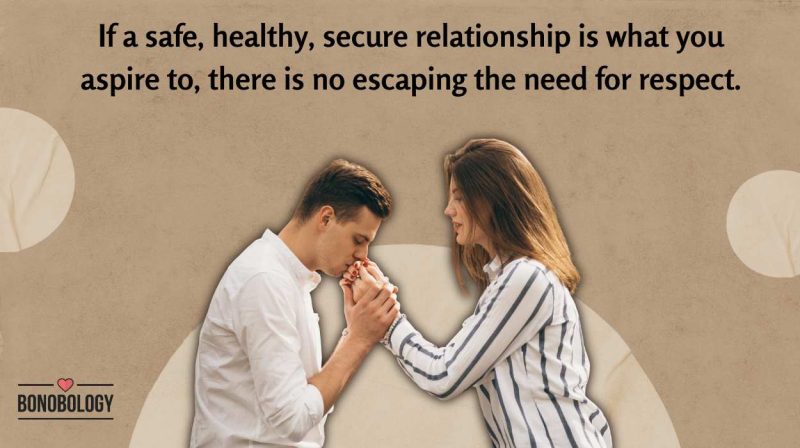

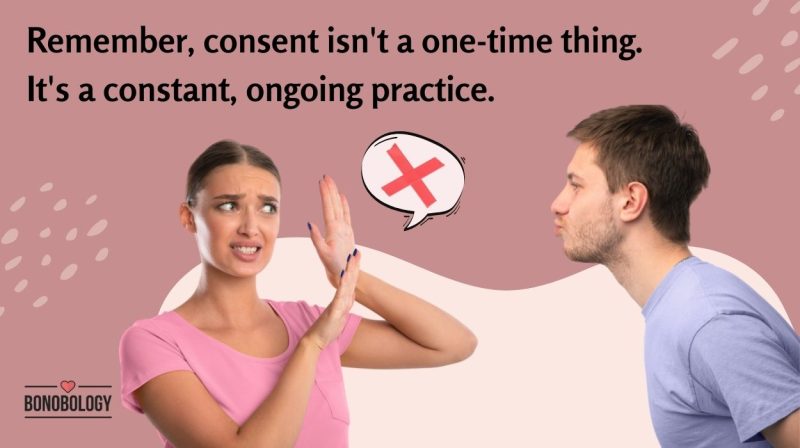

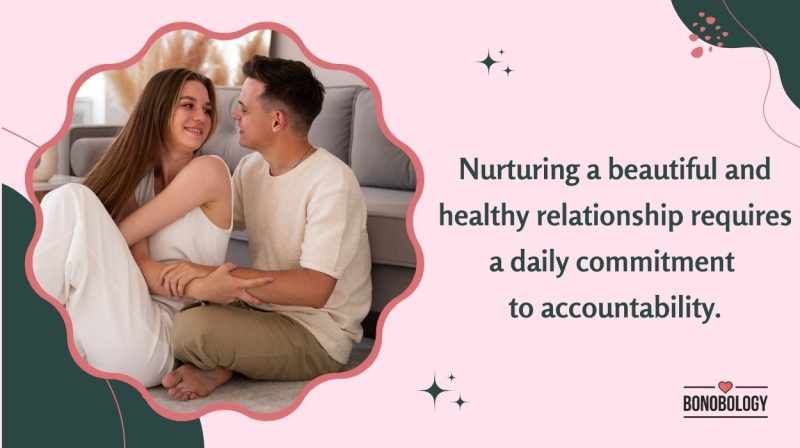






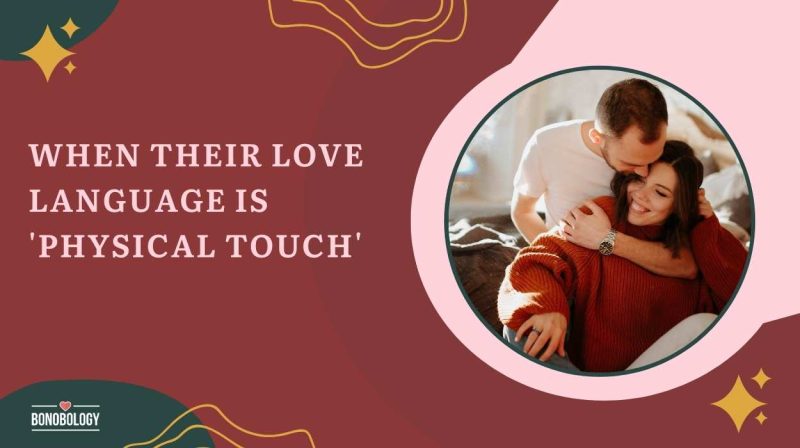
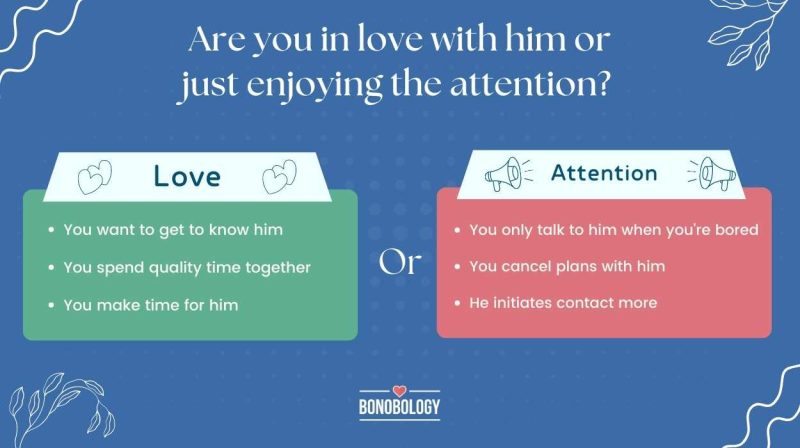
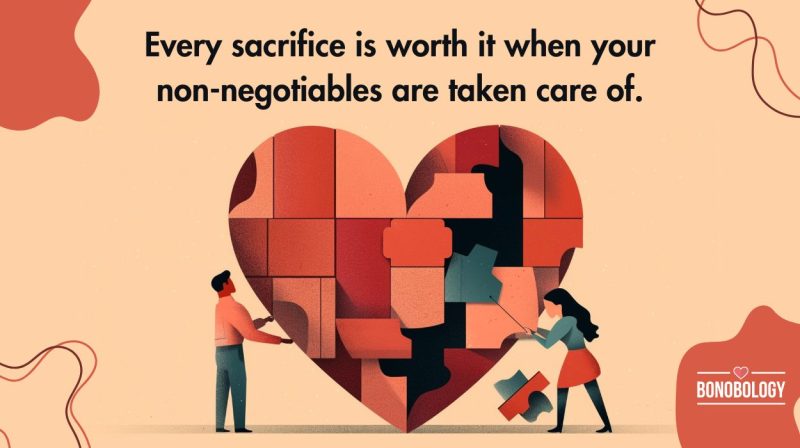
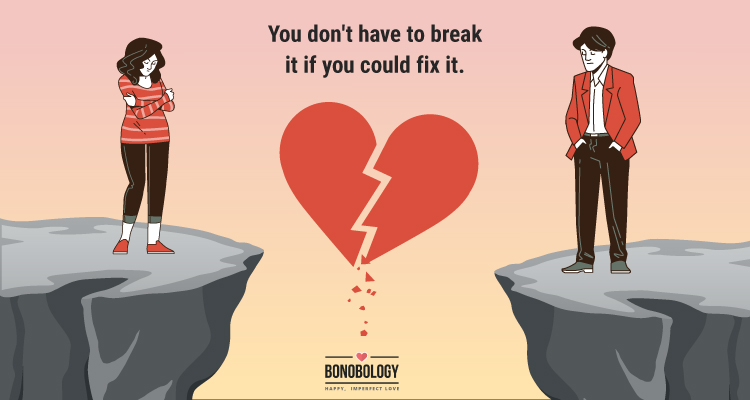
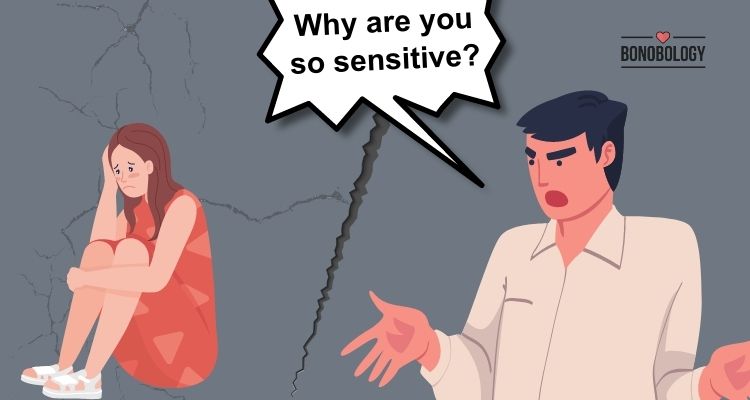

Featured
6 Tips for Helping Your Partner Quit Smoking in Their 50s
How He Treats You Is How He Feels About You — Is It True?
How To Let Someone Down Easy With Kindness And Grace — 13 Tips
How To Show Respect In A Relationship — 9 Ways
The Pitfalls Of Nice Guy Syndrome: How It Affects Relationships
Navigating The Complexities Of Consent In Modern Relationships
11 Ways To Deal With A Sexually Demanding Husband
Accountability In Relationships – Meaning, Importance, And Ways To Practice
How To Apologize To Your Boyfriend: 15 Ways
10 Thought-Provoking Relationship Check-In Questions for Deeper Connection
Is A Monogamous Relationship Right For You? 11 Questions To Help You Find Out
10 Signs You Are In A Truly Stable Relationship (Even If You Feel Otherwise)
7 Subtle Signs Your Partner is Quiet Quitting Your Relationship
Secure Relationships – What Are They And What Do They Look Like?
Physical Touch Love Language: What It Means With Examples
Do I Like Him Or The Attention? Ways To Find Out The Truth
17 Non-Negotiables In Relationships You Must Never Compromise On
15 Ways To Solve Relationship Problems Without Breaking Up
9 Common Narcissist Gaslighting Examples We Hope You Never Hear
The Most Important 7 Qualities Of A Healthy Relationship